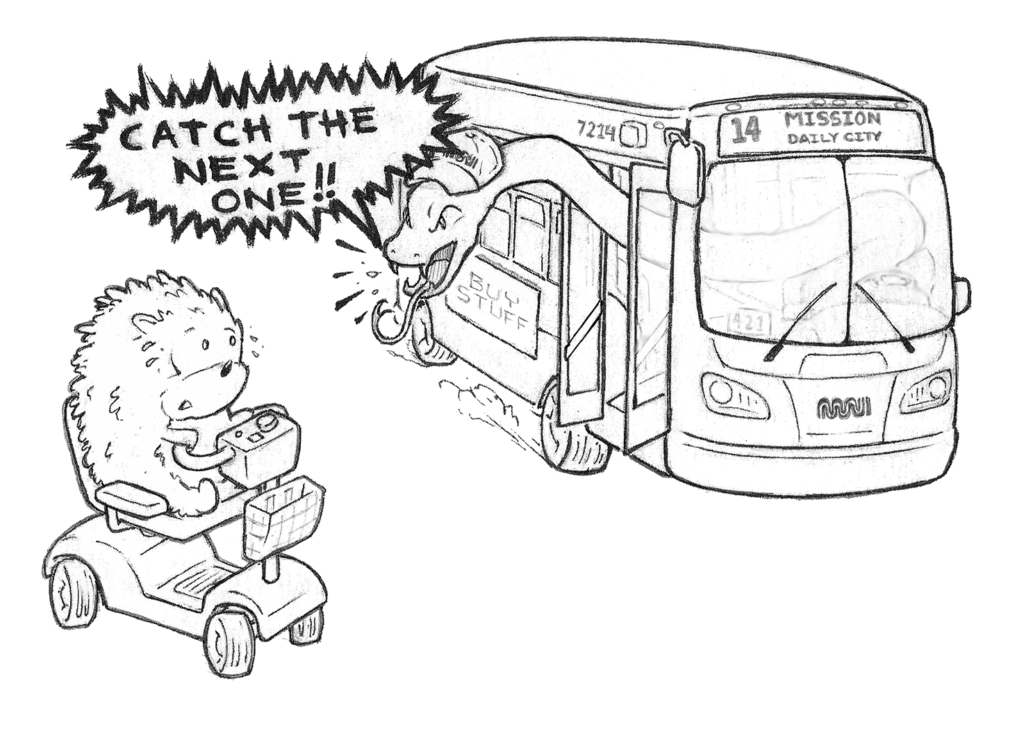
Under federal law, people with disabilities are supposed to have the same access to government-funded services and public transportation as everyone else. Many disabled people suffered and fought for the passage of the ADA, or the Americans With Disabilities Act of 1990, which recognized for the first time many basic rights of disabled people. It was the closest thing we’ve had to a civil rights movement.
However, just because something is law doesn’t mean that people are following all the rules. Anyone using a wheelchair in San Francisco today quickly faces the sobering reality of disenfranchisement and social segregation. MUNI buses routinely pass up wheelchair users, with drivers who ignore us completely, yell out to us, “catch the next one”, berate us like children, or worse. It is not uncommon to wait for three or more buses before a driver will stop to board a wheelchair user. If we are fortunate enough to get a ramp lowered we can expect to be confronted by angry passengers yelling obscenities at us for daring to use public transportation in the first place.

Much of this of course has to do with the overcrowding of our public transit system. However, some of it is outright hostility and ableism, a set of beliefs or practices that devalue and discriminate against disabled people. This poses a serious problem for people who primarily use public transportation to go to doctors appointment, pickup medications, or other basic life needs. Aside from that, it keeps us from leading meaningful lives in the community where we can depend on the same things that able-bodied people have access to. If you can’t get from point A to point B, or you think you might have to confront a bus full of angry people and a hostile driver, you’re more likely to stay at home and hide away from it all. The fear from one of these horrible incidents can also scar you, and make you afraid for your safety every single time you try to board a bus. The fear and humiliation can drive us to segregate ourselves, even more than society already does.
So what can we do? Driver’s don’t report the abuse of passengers and supervisors are not monitoring driver conduct for the bigotry we face. Instead, disabled people like myself have to sacrifice our time to engage in a grueling complaint process. Search around the internet and you will find a 311 form to file online for a “discourteous driver.” It uses confusing language, offers limited accessibility, and requires you to input a lot of your personal information. When filing, it is easy to miss the small check box with an option to request an ADA hearing. The times I called in a complaint over the phone this option was rarely presented to me, and on multiple occasions 311 staff simply didn’t know it existed.
If you’re able to navigate the confusing bureaucracy to get to a hearing, you are given a hearing date over email. These emails are cryptically signed, “Muni Customer Service” without a staff persons name or ADA contact info. The faceless sender also rarely answers important questions about accessibility.
Assuming the email gives you the correct info (one time it gave me the wrong floor and room), and you can make it to 1 South Van Ness, past security, up to the 3rd floor, through the locked security door, and up to the receptionist desk, eventually you will be left in a small board room facing a so-called “neutral” hearing officer. This person will decide if any wrongdoing was done, effectively acting as a judge for your complaint. But here’s the screwy part: that person is employed by SFMTA, the same organization responsible for the discrimination the first place! Needless to say, the hearings are a biased mess, something more akin to an interrogation where the hearing officer fires dozens of questions at you in an attempt to discredit your complaint. They effectively act as a judge, jury, and prosecuting attorney against you. Meanwhile, the driver under investigation has a union representative by their side to answer every question on the their behalf, defend the driver’s case, and represent them as a legal and policy advisor. When I asked SFMTA if they would provide an advisor or disability ombudsman to serve on my behalf they said no, and that no such option would ever be made available.
Over time, I’ve been getting some practice learning about the corrupt procedures and psychological obstacle courses SFMTA has constructed for us. I’ve been learning how to climb up onto my wheelchair to metaphorically jump through the many hoops they wave over me, fighting for my own access, as well as for the thousands of disabled San Franciscans like me. I’m not naive enough to believe that my experiences are isolated ones. I’ve seen bus drivers pass up many disabled people that were unable to speak up for themselves, including those suffering in silence while trying to board hooked up to an oxygen tank. I know a United States veteran from my neighborhood who also uses a wheelchair. He says buses only pick him up fifty percent of the time.

My first ADA hearing in May of 2018 completely caught them by surprise. It is extremely rare for a disabled person to make it all the way through to the hearing process and they clearly weren’t expecting someone with my cognitive abilities and legal know-how. Anticipating some of their aggressive legal maneuvering, I calmly composed myself and responded quickly to the barrage of questions and intimidation tactics. I corrected the hearing officer when he tried to cut me off. I spoke up when the officer only wanted to read half of my complaint for the record. And, best of all, I brought a video camera to record the whole thing to show the world on YouTube. The officer tried to stop me from recording, but I reminded him that these were public hearings and that I was well within my rights. The online video now has 600+ views (and counting).
The first hearing was ruled against me. Even though video footage caught the driver saying, “catch the next one” while speeding past me in a half empty bus, this somehow didn’t count as discrimination. I was told that SFMTA ADA hearings have no appeals process whatsoever. Their ruling was final.
However, the second hearing did deliver a blow to SFMTA’s bigoted status quo. In addition to making video footage of their inaccessible bathroom stalls (could you believe that I couldn’t even close abathroom stall at my own ADA hearing?), I brought a friend and a city commissioner with me as witnesses. Armed with a video camera, footage of the incident, and two caring souls by my side, I persevered.
I was flabbergasted to find that SFMTA had actually been forced to rule in my favor. The driver did violate ADA policy, they said. Would I be compensated for my time and effort in bringing the complaint to them? Would I be given compensation for my missed doctors appointment? Nope. SFMTA doesn’t see any problem with forcing the public to sacrifice their time and personal well-being to educate the transportation authority about discrimination.
Still, the victory was won. And what’s more, while filing my third complaint (currently in progress) I’ve been informed that they’ve made important changes to their ADA procedure because of me! Part of the changes are to cover their butts legally, but the other part of it is their arm being twisted – ever so slightly – to do the right thing. I plan to speak up and record these incidents of abuse and discrimination every chance I get. I plan to keep twisting. And, maybe one day, SFMTA staff will have to grow a conscience and do the right thing. Maybe one day I will be able to plan out my travels and move from point A to point B with the human dignity of an able-bodied San Franciscan.
View Zach K’s video here: https://www.youtube.com/watch?v=M4ftUuXjFjE
Zach K’s website/contact: https://zkarnazes.wixsite.com/access/muni-for-all
—-
Want to make a difference and join the fight? Here’s a few things you can do to improve SFMTA for disabled people. You do not need to be disabled to make a complaint:
1. Keep a notepad close by to record any incidents of discrimination that you see or experience.
2. If available, make a video or voice recording of any incidents of discrimination. All buses are automatically recorded by SFMTA, so you have every legal right to record on a bus as well.
3. Make a note of
a. the bus line and direction (14 Daly
City, 49 Van Ness, etc.)
b. the date and time of the incident
c. the bus number (a 4-digit number in black, on the side of the bus near the top and also the back of the bus).
d. the location or nearest intersection of the incident.
e. general description of the driver (they record everything though, so don’t worry too much about this).
4. Visit https://sf311.org/services/sfmta-muni-complaint to file a complaint
You can call 311 (or 415.701.2311 outside of SF) and go through the prompts..
5. Make sure to check YES for the following:
* “Is your feedback regarding an alleged Americans with Disabilities Act (ADA) violation?” and
* “If your feedback is related to the conduct of a Muni Operator in relation to your ADA violation, would you like to receive information regarding neutral accessibility hearings?”
6. Include a detailed description of what happened. Include your email and make sure to demand a record of the video footage.
7. Often times SFMTA will not give you the bus video footage when asked for. In that case, you can make a request using the Freedom of Information Act (FOIA). You can make a SFMTA Public Records request at: https://sfmta.mycusthelp.com/WEBAPP/_rs/supporthome.aspx
Make sure to include:
“Under the California Public Records Act § 6250 et seq., I am requesting an opportunity to inspect or obtain copies of all public records that are related to case numbers…” and include the case number 311 gave you. Make it clear that you are asking for the video footage of the incident (include start/end date and time). Make sure your request includes a time 10 minutes before and after the incident to make sure you dont miss anything.
There is more information on complaints here: https://www.sfmta.com/accessibility-complaints
It can be a daunting looking process, so feel free to reach out to the author, Zach K here

